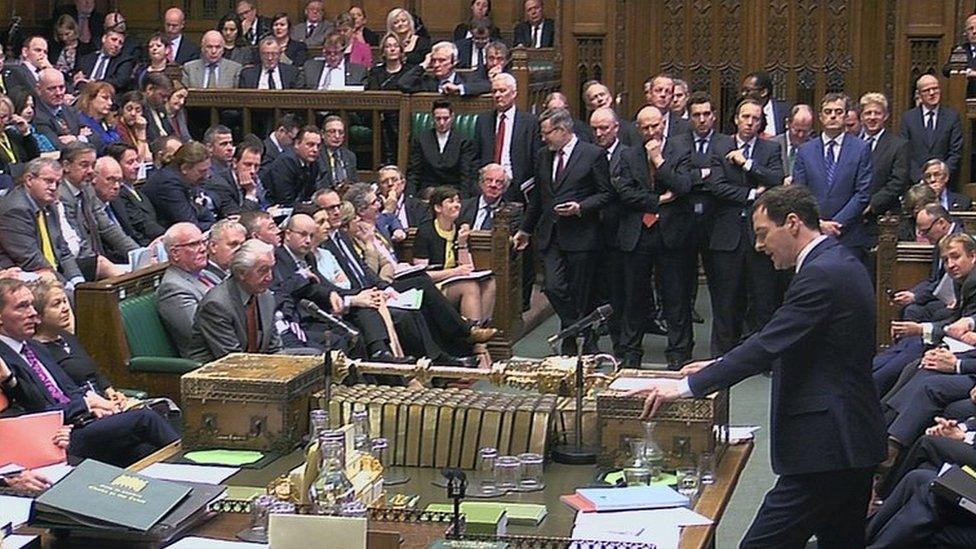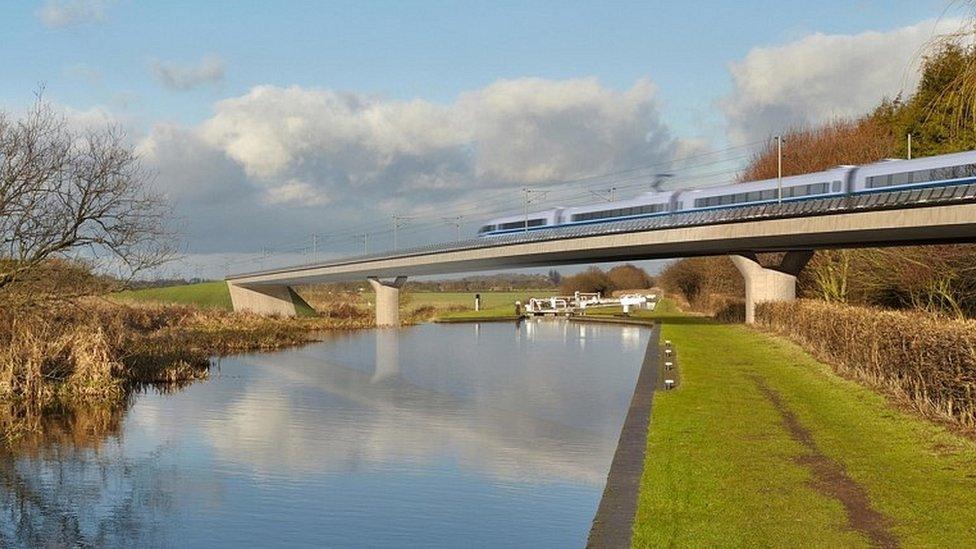Week ahead
- Published

Last Wednesday's Budget Day cheers have faded, and the Chancellor faces triple trouble as the four day debate on his eighth Budget ends on Tuesday.
When the Budget resolutions are voted on, there are two amendments: both of which could well attract that rare combination of Labour, SNP, minor party and dissident Tory support that is needed to overturn the government majority.
There's a cross-party amendment calling for VAT on women's sanitary products to be zero-rated, which looks likely to be pressed even though the government believes it has secured EU agreement to allow this to happen.
Then there's a Labour amendment, signed by at least a dozen Conservatives, which would, in effect, reject a European Court of Justice ruling requiring Britain to increase VAT on home insulation and energy saving products from 5% to 20%.
There's quite a cocktail of motives behind the two amendments - feminist and green arguments, to be sure; but also an anti-EU point about control of taxes in the UK, mixed in with some gleeful manoeuvring in the undeclared race to succeed David Cameron.
The third Budget-related issue is the government proposal to change the rules on Personal Independence Payments (PIPs) - the benefit which has replaced Disability Living Allowance.
A number of Tory backbenchers including David Burrowes, the architect of the recent government defeat on Sunday Trading, have been expressing concern about the impact on vulnerable people.
This measure won't be in the forthcoming Finance Bill, and the government has now promised consultation and hinted at compromise, after a nervy couple of days which saw a rather undignified blame game played out between the Treasury and the Department of Work and Pensions, and an increasingly irritated Downing Street.
Expect Labour gloating and semi-public negotiation between ministers and Conservative backbenchers, as the Budget debate unfolds. And note that the other implication of this not being a Finance Bill measure is that it could therefore run into trouble in the Lords, (who're not able to touch finance measures) as well as the Commons.
And speaking of their Lordships' House, the government has been having a pretty rough ride there; but after some fairly gruelling sessions on the Housing and Planning Bill - including a till-they-drop committee stage day which went on until nearly midnight, it looks as if the bill is back on track and should enter report stage immediately after the Easter break, just about keeping the show on the road.
The government will be reasonably well placed to deal with outstanding differences between the Lords and Commons on its remaining legislation without too much panic or pressure, before the end of the session.
But having suffered a bruising week, with six government defeats (two on the Immigration Bill, three on the Trade Union Bill and one on a move to regret the early closing of the Renewables Obligation to small solar photovoltaic installations) ministers can't contemplate their next few weeks in the Upper House with great confidence. The majorities against the government on the Trade Union Bill varied between 88 and 148 votes, which will certainly embolden the Opposition to keep resisting.
Here's my rundown of the parliamentary week ahead:
Monday
The Commons opens (2.30pm) with Communities and Local Government questions, followed by the continuation of the Budget debate.
In Westminster Hall (at 4.30pm), MPs will debate E-petition 121262 on the NHS's contract negotiations with the BMA - which has attracted 118,455 signatures. The petition accuses the Health Secretary, Jeremy Hunt, of imposing new contracts on junior doctors, "in his endeavour to destroy the NHS and privatise healthcare in the UK".
The Government response says there will be no imposition and that the aim is to introduce a fairer, safer contract, which they can do for new staff and as contracts expire as juniors move through training.
In the Lords, (2.30pm) after their usual half hour of questions to ministers, peers will deal with no fewer than three bills - a sign that the scheduling has become a little frayed.
First up is the third reading of the Scotland Bill. Normally these are quite brief exercises in rubber stamping, but there is talk of a last ditch amendment on the rather arcane issue of the "Sewell Convention" under which the UK and Scottish Parliaments pass legislative consent motions to avoid treading on each other's toes.
This is followed by the Immigration Bill, report stage, day two. Key issues will be Lord Dubs' amendment on unaccompanied refugee children, family reunion for asylum seekers, genocide and the immigration skills charge (likely to be in relation to universities and the health sector).
Finally, there will be be some further consideration of the Housing and Planning Bill including "permission in principle".
Tuesday
The Commons opens (11.30am) with Health questions. Then, Labour MP Wes Streeting has a Ten Minute Rule Bill on Taxi and Private Hire Vehicle Operators (Regulation) - this aims to increase training requirements for those seeking a PHV (private hire vehicle) licence, external, to improve safety and ensure a more level playing field between training requirements for drivers of taxis and PHVs; to switch to an "operators insurance" system where PHV companies are responsible for insuring their drivers rather than drivers individually, and to ensure multinational operators pay full taxes on money earned in the UK by closing legal 'loopholes' which enable profits to be transferred to another country.
When that is dealt with, the House moves onto the conclusion of the Budget debate - and the Budget resolutions (see above).
The adjournment debate, led by the Conservative Jake Berry is on government policy to prevent breast ironing in the UK - this is painful form of ritual body mutilation, which involves pounding and massaging the developing breasts of young girls with objects that have been heated over coals.
In Westminster Hall, there are debates on the importation of faulty electrical goods (9.30am-11am); the first anniversary of war in Yemen (11am- 11.30am); GPS satellite navigation and heavy goods vehicles (2.30pm-4pm); the persecution of Christians and other religious minorities under Daesh (4pm-4.30pm) and the Macur Review into historic child abuse - from Liz Saville Roberts (4.30pm-5.30pm).
In the Lords (at 2.30pm) peers grind on through the Housing and Planning Bill committee stage (day eight of nine) where the main issue in play will be the privatisation of the preparation of planning applications.
Wednesday
The Commons opens (11.30am) with Scottish questions, and at noon there is Prime Minister's Questions.
That's followed by an interesting Ten Minute Rule Bill on Cannabis (Legalisation and Regulation) from Norman Lamb, The Lib Dem former health minister believes that there is a strong public health case for regulating (and taxing) the trade rather than allowing organised crime to sell what may be very dangerous forms of cannabis.
The day's main legislating is on the HS2 Bill - aka the High Speed Rail (London - West Midlands) Bill. This is the report stage, after a gruelling two-year committee stage, in which people affected by the controversial mega-project have petitioned MPs for more compensation, changes to the route and environmental protections.

Controversial history: this picture was issued by HS2 of the Birmingham and Fazeley viaduct
There's an amendment down from the Conservative Michael Fabricant, whose Litchfield constituency is along the route of the new line, to kill the whole bill. It is highly unlikely to be selected, and Mr Fabricant would not push it to a vote if it was (defeat would be certain given the scheme has Conservative and Labour support) but it puts his objections on the record.
Arch HS2 opponent Cheryl Gillan has a series of amendments on everything from compensation to tree planting - but her key proposal is for an adjudicator to deal with complaints during the construction process. Once approved by MPs, the bill goes to the Lords.
Next, there's a motion on "Short Money" - the funding given to opposition parties to support their parliamentary work, which pays for assorted researcher/spin doctor figures. The government had proposed major cuts, to the fury of the Opposition parties and seems to be backing rapidly down - not least because it infuriates potential Commons allies, who might be needed when their narrow majority is in danger. Expect some quiet crowing when the retreat is sounded.
There's also a slot pencilled in for consideration of any Lords amendments to bills - and after the recent defeats on the Immigration Bill and the Trade Union Bill there will have to be quite a few of bouts of "Parliamentary ping-pong" with their Lordships, in the coming weeks.
The adjournment debate, from Labour's Stephen Hepburn, is on the prosecution of construction companies for fatal accidents.
In Westminster Hall, there are debates on: the political situation in Burma (9.30am -11am); legal guardianship and missing people (11am- 11.30am); enforcement of the national minimum wage in the care sector (2.30pm- 4pm); the registration of births of children of deceased people (4pm- 4.30pm), and Hong Kong and the Sino-British Joint Declaration (4.30pm- 5.30pm).
In the Lords (3pm) there's yet more committee stage debate on the Housing and Planning Bill - but this should be the final day, allowing the bill to move to report stage after Easter.
And peers will also debate two statutory instruments on the Greater Manchester Authority and on the Tees Valley Combined Authority; after which peers rise for their Easter break.
Thursday
In the Commons (9.30am) MPs open with Energy and Climate Change questions, which will be followed by the weekly Business Statement from the Leader of the House, Chris Grayling.
The rest of the day is dedicated to backbench business - first a debate on court closures - and then the debate on the Easter adjournment, in which MPs can speak about any subject that takes their fancy.
The adjournment debate is followed by an adjournment debate - in this case, former Army officer Johnny Mercer on the role of charities in the veterans' care sector.
Parliament returns after Easter, on Monday 11 April.